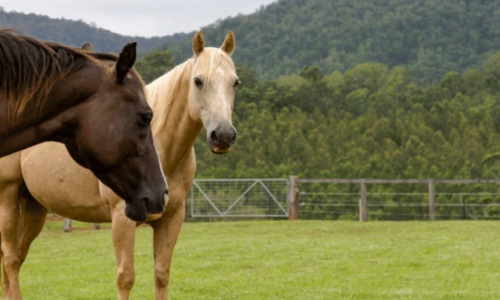Deadly virus resurfaces as safety concerns grow: 'It is rare'
By
Gian T
- Replies 0
Australia is once again on high alert after a state has recorded its first fatal case of the virus since 2022.
This reminds us all of the ongoing risks posed by this rare but deadly disease.
For many of us who remember the first outbreak in the 1990s, news like this can be unsettling, especially for those living in rural or semi-rural areas or anyone with a love of horses.
The Hendra virus is a severe infection in flying foxes (fruit bats) and is most commonly transmitted to horses.
While it’s rare, the virus can also jump from horses to humans and, in even rarer cases, to dogs.
The disease is unique to Australia, with the first outbreak recorded in 1994 at a racing stable in the Brisbane suburb of Hendra—hence the name.
Since then, more than 90 horses have been infected, all of which have either died from the virus or been euthanised.
Human cases are even rarer, but of the seven people known to have contracted Hendra, four have tragically died. The most recent human fatality was in 2009.
Biosecurity Queensland confirmed that an unvaccinated horse in the state’s south-east tested positive for Hendra virus last Friday.
The horse’s condition deteriorated rapidly, and it sadly died soon after. This marks Queensland’s first case of the virus in two years.
Authorities have moved quickly to contain the risk. Dr Fiona Thompson, Acting Chief Veterinary Officer at Biosecurity Queensland, said that tracing and exposure assessments are underway for other animals on the property.
Queensland Health has also reached out to everyone who may have had contact with the infected horse to ensure their safety.
‘While the Hendra virus can spread from horses to people, it is rare,’ said Queensland Chief Health Officer Dr Heidi Carroll.
‘Most people exposed remain well and don’t contract the infection. However, those with a high level of exposure will undergo prioritised testing.’
The exact method of transmission isn’t fully understood, but it’s believed that horses become infected by coming into contact with material contaminated by the bodily fluids or excretions of infected flying foxes.
The virus can then spread from horse to horse through contact with infectious fluids or contaminated equipment.
For humans, all known cases have involved close, high-risk contact with infected horses, usually in veterinary or horse care settings.
There’s no evidence of the virus spreading directly from flying foxes to humans, or from human to human.
In humans, Hendra virus infection can look a lot like the flu at first: fever, cough, sore throat, headaches, and tiredness.
In more severe cases, it can cause encephalitis (inflammation of the brain), leading to symptoms like high fever, drowsiness, convulsions, and even coma.
The time from exposure to illness can range from five to 21 days.
Horses, on the other hand, can be harder to diagnose. Early signs include fever, increased heart rate, restlessness, weakness, and muscle twitching.
If you notice any of these symptoms in your horse, it’s crucial to contact your vet immediately.
The good news is that there is a vaccine for horses, which is highly effective at preventing Hendra virus infection.
Unfortunately, there’s no vaccine for humans, so prevention relies on good biosecurity and hygiene practices.
Biosecurity Queensland urges anyone who owns or works with horses to take key precautions to reduce the risk of Hendra virus.
This includes vaccinating horses, washing hands thoroughly after handling them, and covering any wounds with waterproof dressings.
Wearing personal protective equipment is essential when dealing with sick horses or their fluids.
It's also important to avoid contact with animals showing signs of illness until a vet has examined them and to regularly clean and disinfect any equipment or surfaces that come into contact with horses.
Even if your horse is vaccinated, it’s important to maintain these precautions year-round, as Hendra virus infection can occur at any time.
While the risk to the general public remains low, this latest case is a timely reminder for horse owners and those living in affected regions to stay vigilant.
If you’re ever in doubt about your own risk or the health of your animals, don’t hesitate to contact your veterinarian or local health authorities.
 Have you or someone you know ever had a close call with Hendra virus? Are you a horse owner who’s taken steps to protect your animals? Or do you have questions about how to stay safe? We’d love to hear your thoughts and experiences—share your stories in the comments below.
Have you or someone you know ever had a close call with Hendra virus? Are you a horse owner who’s taken steps to protect your animals? Or do you have questions about how to stay safe? We’d love to hear your thoughts and experiences—share your stories in the comments below.
Read more: Experts warn prices could skyrocket if this virus isn't controlled–here’s why you should care
This reminds us all of the ongoing risks posed by this rare but deadly disease.
For many of us who remember the first outbreak in the 1990s, news like this can be unsettling, especially for those living in rural or semi-rural areas or anyone with a love of horses.
The Hendra virus is a severe infection in flying foxes (fruit bats) and is most commonly transmitted to horses.
While it’s rare, the virus can also jump from horses to humans and, in even rarer cases, to dogs.
The disease is unique to Australia, with the first outbreak recorded in 1994 at a racing stable in the Brisbane suburb of Hendra—hence the name.
Since then, more than 90 horses have been infected, all of which have either died from the virus or been euthanised.
Human cases are even rarer, but of the seven people known to have contracted Hendra, four have tragically died. The most recent human fatality was in 2009.
Biosecurity Queensland confirmed that an unvaccinated horse in the state’s south-east tested positive for Hendra virus last Friday.
The horse’s condition deteriorated rapidly, and it sadly died soon after. This marks Queensland’s first case of the virus in two years.
Authorities have moved quickly to contain the risk. Dr Fiona Thompson, Acting Chief Veterinary Officer at Biosecurity Queensland, said that tracing and exposure assessments are underway for other animals on the property.
Queensland Health has also reached out to everyone who may have had contact with the infected horse to ensure their safety.
‘While the Hendra virus can spread from horses to people, it is rare,’ said Queensland Chief Health Officer Dr Heidi Carroll.
‘Most people exposed remain well and don’t contract the infection. However, those with a high level of exposure will undergo prioritised testing.’
The virus can then spread from horse to horse through contact with infectious fluids or contaminated equipment.
For humans, all known cases have involved close, high-risk contact with infected horses, usually in veterinary or horse care settings.
There’s no evidence of the virus spreading directly from flying foxes to humans, or from human to human.
In humans, Hendra virus infection can look a lot like the flu at first: fever, cough, sore throat, headaches, and tiredness.
In more severe cases, it can cause encephalitis (inflammation of the brain), leading to symptoms like high fever, drowsiness, convulsions, and even coma.
Horses, on the other hand, can be harder to diagnose. Early signs include fever, increased heart rate, restlessness, weakness, and muscle twitching.
If you notice any of these symptoms in your horse, it’s crucial to contact your vet immediately.
The good news is that there is a vaccine for horses, which is highly effective at preventing Hendra virus infection.
Unfortunately, there’s no vaccine for humans, so prevention relies on good biosecurity and hygiene practices.
Biosecurity Queensland urges anyone who owns or works with horses to take key precautions to reduce the risk of Hendra virus.
Wearing personal protective equipment is essential when dealing with sick horses or their fluids.
It's also important to avoid contact with animals showing signs of illness until a vet has examined them and to regularly clean and disinfect any equipment or surfaces that come into contact with horses.
Even if your horse is vaccinated, it’s important to maintain these precautions year-round, as Hendra virus infection can occur at any time.
While the risk to the general public remains low, this latest case is a timely reminder for horse owners and those living in affected regions to stay vigilant.
If you’re ever in doubt about your own risk or the health of your animals, don’t hesitate to contact your veterinarian or local health authorities.
Key Takeaways
- Queensland has recorded its first fatal case of Hendra virus since 2022 after an unvaccinated horse tested positive and died in the state’s southeast.
- Authorities, including Biosecurity Queensland and Queensland Health, are carrying out contact tracing and exposure assessments for people and animals who may have come into contact with the infected horse.
- Hendra virus is a rare but deadly disease that spreads from flying foxes to horses and, in rare cases, to humans, mostly through direct, high-level exposure to infected horses.
- Horse owners are urged to practise good biosecurity and hygiene measures and ensure horses are vaccinated, as there is no vaccine for humans, and infection in people can be very serious or fatal.
Read more: Experts warn prices could skyrocket if this virus isn't controlled–here’s why you should care








